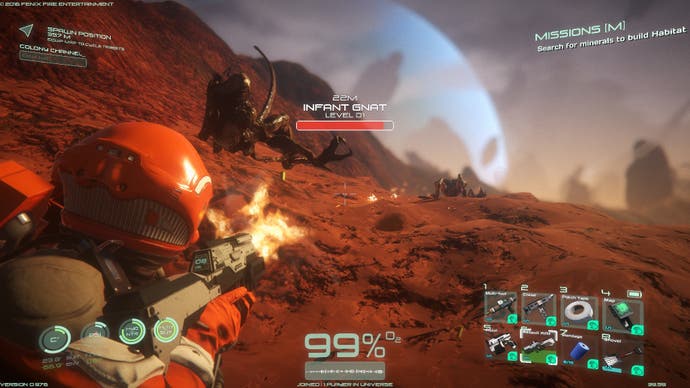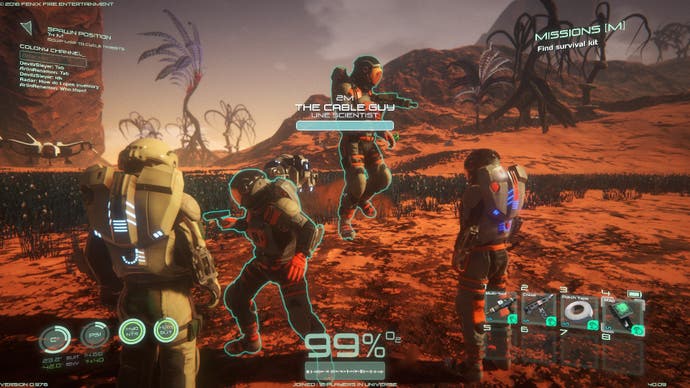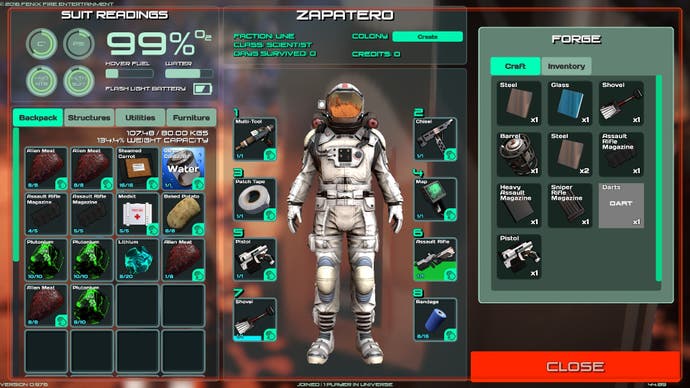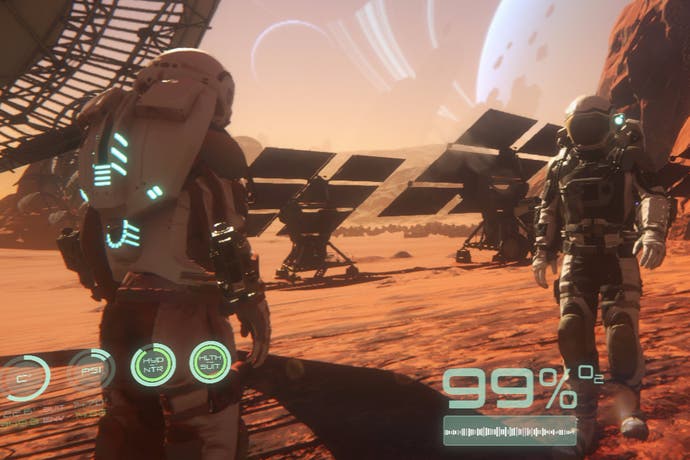Osiris: New Dawn breaks through, but will it survive Early Access?
Rising up to the challenge of its rivals.
In the primordial soup that is Steam Early Access a new game is being formed. It's called Osiris: New Dawn and since its appearance a few weeks back it's been bobbing about with Mafia 3, Civ 6 and Rocket League in the Top Seller list. If you haven't already taken a cursory gander, you can probably guess from its sudden rise to prominence that it's an open world collect-and-survive game, one of an increasing number of like-minded titles that simmer around Steam's development fumarole, sometimes evolving, sometimes not, and whose creators are often dragged beneath the toxic discourse that bellows up in the wake of an absent, insubstantial or unpopular update.
Quite why Osiris has taken off so early in its life cycle is hard to fully pin down. Perhaps it has something to do with the backlash that followed the September release of Scorched Earth for the dinosaur-themed ARK: Survival Evolved, its developer - arguably rather greedily - releasing it as fully-formed premium update to an eminently playable but unfinished game. Or maybe, despite both being significantly different in scope, favourable comparisons with No Man's Sky are similarly causing people to reassign their optimism towards Fenix Fire, rather than in this case leaving it in the hands of Hello Games' capacity to make good on its vague intimations. (Which begs the question where might No Man's Sky be had it gone for the Early Access route? The answer to which, for better or worse, is, still there.)
Then there is the more obvious explanation, that people still can't get enough open world survival games, which on the face of it seems reasonable to assume. However, given the sheer number of them, and the fact that there's currently at least one for every theme and style of play, people must surely be running low in their capacity to play them all, regardless of their respective states of completion. In the case of, er, sci-fi-val games (sorry), there is already an accomplished roster of titles that has beaten Osiris in the race to colonise new worlds: Empyrion, Space Engineers, Eden Star, Take On Mars, Starbound - to name but a few.

My own view on things, having dabbled in all the above titles and quite a few more is that while the desired features and much of the content exists in a great many Early Access survival games, the fundamentals are often awkward and misaligned, which in the long term can often undermine the game and mire it in development limbo. In contrast the makers of Osiris, reminiscent of what I think is the most polished survival title in Early Access, Subnautica, seems to have very solid foundations underpinning it, with currently a single environment that is vivid and dynamic, evolved character movement and a crafting system that although fairly standard in its structure, is easy to navigate and progress through.
The premise of Osiris is set 40 years hence and sees two factions searching for an Earth-like planet, both finding themselves on a hostile and seemingly barren moon upon which they must fight to survive. Cue then lots of early chipping away at rocky outcrops and tree-like flora, building and furnishing a base of operations, then defending it from the other faction and the local wildlife with various weapons and vehicles, such as hover bikes, rovers and mechs - assuming you've done all the required resource collection chores beforehand, of course.
Although it takes a few hours to find the materials to build the high-end gear, you do at least start with a nifty set of jet boots and cuffs, making sure that navigation is engaging from the get-go. Character movement generally is exceptionally evolved, suggestive that beyond the cooperative exploration and base building of the current build, where Osiris is looking to ultimately conquer is online shooter territory. It can only be a good thing then that whilst rocketing about and taking down the game's Necromorph-inspired creatures, I felt a severe pang of nostalgia for TimeGate's perennially overlooked Section 8.

While the amount of content at this point is generally lacking there's enough about the initial release of Osisis to both enjoy now and give cause to eagerly await the next update. For me it's the otherwise insignificant details that enliven the game as it stands, such as the red dust that curls into the atmosphere during a storm, the vice-like darkness and the fragility of the Space 1999-styled domes and airlocks, as well as your personal mining droid, which rather ominously looks like one of A Space Odyssey's Discovery One EVA pods.
Given that character development is essentially non-existent, the tech tree is limited and planned features like research, player classes (scientist, marine, engineer and ranger), flying about in space and exploring underground caves are all still to be implemented, there is a great deal of hope and potential for Osiris to overtake the likes of DayZ, Rust and ARK as the most prominent survival game in development. Certainly already, the aforementioned Subnautica aside, it's among the most accessible and arresting.

But of course we mustn't overlook the fact that Early Access games don't always fulfil their potential. More pertinently those tagged Open World and Survival rarely even make it out of Early Access at all. DayZ and Rust have been in Early Access for almost three years, Space Engineers for even longer. The Long Dark and Subnautica have both chalked up two years and are probably the best candidates for release, but yet right now it seems that not one of them wants to grow a pair, leave the swamp for dry land and declare themselves fully evolved.
Part of the reason is of course that they're not finished, but one almost gets the impression that the makers of these games don't want to call time on their often ambitious efforts; that to break cover and leave Early Access is to cast aside the crutch of saying that development is ongoing, the game is likely to change and that the current state somehow unrepresentative of the developer's ultimate vision.
Leaving Early Access behind, especially for a genre whose appeal is often ingrained in its nebulous community-driven designs and constantly evolving systems, is so fraught with uncertainty as to practically be unprecedented. Given that Fenix Fire is a two person team, even with five years of impressive work already poured into Osiris, we can be fairly certain it will be swimming in the albumen of Early Access for quite some time - by which point Mafia 3 will have long been sleeping with the fishes.








